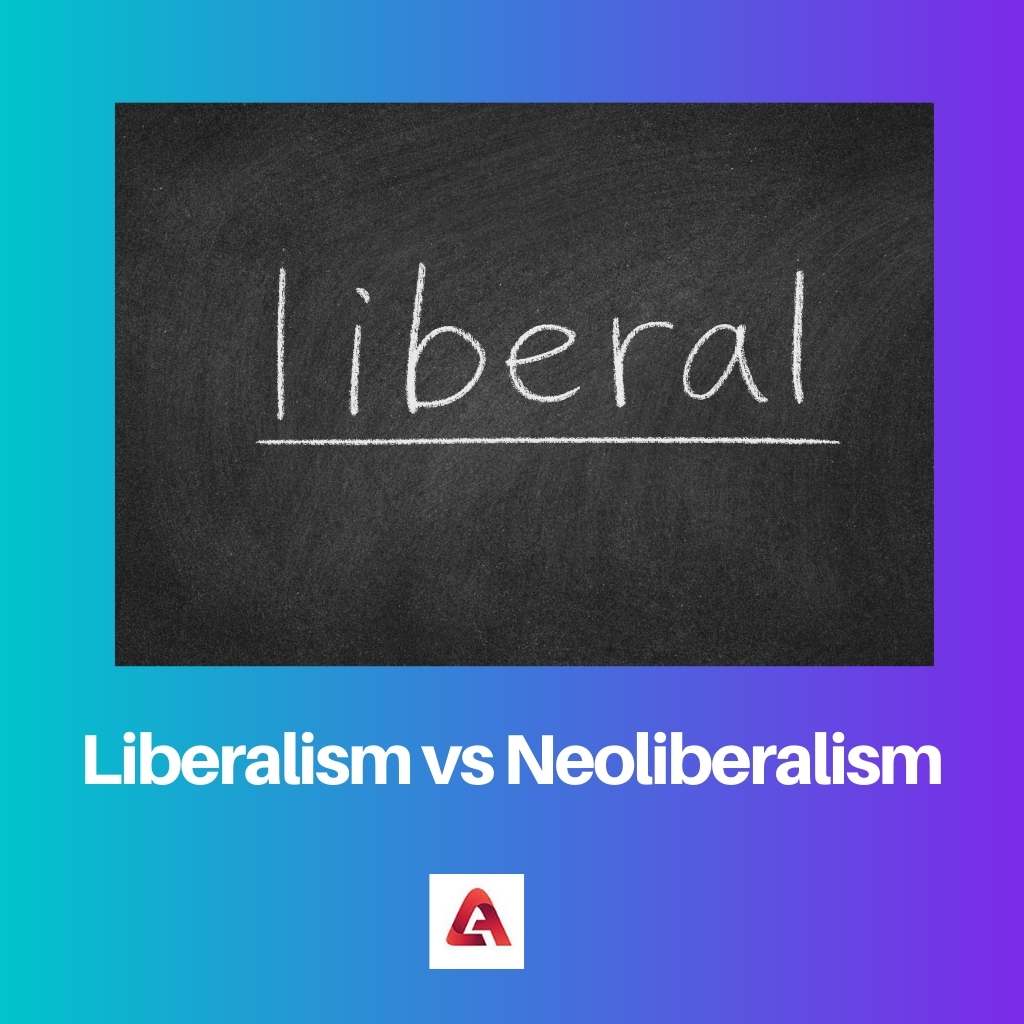In present day world, the word Liberal has got popularized a lot. The term has it’s origination from somewhere else. As the two terms, Liberalism and Neoliberalism, from which the word liberal has arrived, may sound to be almost similar, both terms have quite a bit of a different perspective in them.
Key Takeaways
- Liberalism emphasizes individual freedoms, democratic governance, and social justice, while neoliberalism focuses on free-market capitalism and minimal government intervention.
- Neoliberalism emerged as a response to the perceived failures of traditional liberalism and Keynesian economics in the 20th century.
- Critics argue that neoliberal policies can increase income inequality and undermine social welfare programs, whereas proponents believe they promote economic growth and efficiency.
Liberalism vs Neoliberalism
Liberalism is a political school of thought that is focused on the idea of freedom and liberty in various forms. It was introduced by John Locke during the age of enlightenment. Neoliberalism is an economic ideology that emerged in the 20th century and believed in a free economy, free trade, and privatization.

Liberalism is built with a political philosophy for offering freedom and liberty to people in a variety of aspects. It was introduced during the age of enlightenment by John Locke. It was concerned with different fields of individual freedom, including thoughts, religion, life, right of property ownership, and others. Liberalists believe that every individual has the birthright to freedom and liberty.
Neoliberalism is an economic concept with is concerned with free trade, economy, and privatization. It also encouraged cutting down the investments by the government and involving private sectors in the economy. It was brought to life during the 20th century to cease the economic unrest and failures in the previous eras.
Comparison Table
| Parameters Of Comparison | Liberalism | Neoliberalism |
|---|---|---|
| Definition | Liberalism can be coined as a political philosophy that primarily focuses on the idea of liberty and freedom in various forms. | Neoliberalism can be coined as an economic philosophy that primarily focuses on offering a free economy, trade, and privatization. |
| Period | The idea or philosophy of liberalism ignited during the age of enlightenment. John Locke, a philosopher, is considered to introduce philosophy. | The idea or philosophy of neoliberalism ignited during the 20th century. It was developed for overcoming the economic backwardness of the previous periods. |
| Focus | The primary focus of the ideology is individual freedom of religion, thoughts, ownership of property, life, and others. | The primary focus of neoliberalism differs from that of liberalism as it attends to free trade as well as privatization, and others. |
| Philosophy perspective | The philosophy associated with liberalism is political. It focuses on property ownership, civil rights, democracy, and other related aspects. | The philosophy associated with neoliberalism is economic. It was aligned to reducing economic regulations, privatization, free trade, and others. |
| Implications | It is highly used or applied in a lot of nations. It was vastly used in the 19th century by South America, Europe, and North America. | Unlike liberalism, neoliberalism is declined and the terminology is hardly used. Later periods, it was evolved to be a social market theory. |
What is Liberalism?
Liberalism can be defined as a political philosophy that focuses on the ideology of providing liberation and freedom. John Locke is considered to be the first individual to coin this term, and it was introduced during the period of enlightenment. Though multiple concepts encompass the term liberalism, it is concerned with the ideas of democracy, property ownership, civil rights, religion, and others. As per John Locke, it is the birthright of every individual to the right to freedom, proper inheritance, and to lead a life with freedom.
Thus, the liberalists believed that any existing social threads should not hamper these individual rights. Democracy was encouraged in this ideology as the liberalists were against the concept of monarchy. They disregarded the idea of state religion, absolute monarchy, and the full-fledged authority and power of the kings. After the French revolution, this ideology was vastly embraced by the nations. In the 19th century, liberal governments were introduced in North America, Europe, and South America. Liberalists believed in encouraging individual rights, freedom of speech, freedom of religion, freedom of the press, secularism, as well as market economy. This concept has drawn support as well as criticisms with the gradual progression of the period.

What is Neoliberalism?
Neoliberalism is described as an economic concept that encourages free trade and other economic aspects. This concept was introduced in the 20th century centring on free-market capitalism. It was ignited with the concept of reducing government spending primarily to encourage the private sector’s intervention in the economic system. It encouraged the concept of introducing free policies in the economic system.
It brought about a drastic change in the economic aspect with the introduction of these policies and regulations. Neoliberalism is primarily aimed at implementing policies regarding free trade, reduction of economic regulations, privatization, deregulation, globalization, austerity, and other policies. According to the neoliberalist, private investment was viewed as one of the most impactful activities in the market. The involvement of the private sector in a free economy was considered to be a vital aspect of this concept. Due to the constant economic backwardness and failures in the previous periods, the concept of neoliberalism was constructed to avoid them. It later evolved to become a theory of social market with the state as support. The Great Recession that took place in 2008 gave birth to various criticisms regarding the concept of neoliberalism and the need to alter certain policies related to the economic system.

Main Differences Between Liberalism and Neoliberalism
- Liberalism is a political philosophy, whereas neoliberalism is an economic concept.
- Liberalism primarily focuses on freedom and liberty in the form of religion, thoughts, property ownership, life, and others. It also focuses on democracy and freedom in many other aspects. On the other hand, neoliberalism focuses on a free economy, privatization, trade, austerity, globalization, and others.
- Liberalism was founded in the age of enlightenment by John Locke, while neoliberalism was founded in the 20th century.
- Liberalism was vastly used by nations. It was used by Europe, North America, and South America, and their government was changed into liberalism governments. The term neoliberalism was hardly used in the later period.
- Liberalism is much widely used, while Neo-Liberalism is not that widely used.
- https://oxfordre.com/communication/view/10.1093/acrefore/9780190228613.001.0001/acrefore-9780190228613-e-176
- https://d1wqtxts1xzle7.cloudfront.net/57851509/neoliberalism-with-cover-page-v2.pdf?Expires=1635542066&Signature=DZmrVnOvDUmbAkLaCHe6HUTogbV1iNhAq-rgb4K50l6hcWabGhi3foP5VuI5Xc47yGhNnuQqdMgQaQKyLTsktYvuHLmfLTCtANiOwUzFo7Lj6SWrSrIPaR58mFmf19L7sP-rJRgUCn6Ml5q1em-NrP9Q-YTGXGRT0oCH55FFcBpN5TtHvPXzF29XZJFRHFrVX67oDIrCMew7ksygjOSxldsQ3OoO6C15jNNOCVk~RtSZqzuwiECFXjmuGjCweB68xiOi8ItghDDmeUNUMRk9kw-y8Wmsfk1~zUypI2oHTBmgRRbLvAb1OU9CnSTe4SqpQQUaNl1JSmHIv1zKdYCVMw__&Key-Pair-Id=APKAJLOHF5GGSLRBV4ZA
The descriptions of liberalism and neoliberalism provided here are well-researched and backed by historical context, contributing to a comprehensive understanding of these ideologies.
The in-depth exploration of liberalism and neoliberalism, supported by historical context and a comparative analysis, makes this article a valuable educational resource for those interested in political and economic theory.
The article presents a thorough and well-structured analysis of liberalism and neoliberalism, providing readers with an insightful comparison of their key principles and historical significance.
I agree, the article does a thorough job of explaining the key differences between liberalism and neoliberalism, shedding light on their core principles and historical significance.
The comprehensive examination of liberalism and neoliberalism offered in this article is both enlightening and intellectually stimulating, promoting a deeper understanding of these ideologies.
The article effectively captures the essence of liberalism and neoliberalism, presenting their philosophical and economic underpinnings with clarity and precision.
The article explains the fundamental differences between liberalism and neoliberalism quite clearly and succinctly, providing a comprehensive overview of both concepts and their historical origins.
The detailed explanations of what liberalism and neoliberalism entail, along with their implications and historical perspectives, make this article a valuable resource for anyone seeking to understand these socio-political concepts.
The comparison table is a great addition to the article, making it easier to understand the distinctions between liberalism and neoliberalism. The historical background provided is also very informative, giving context to the development of both ideologies.